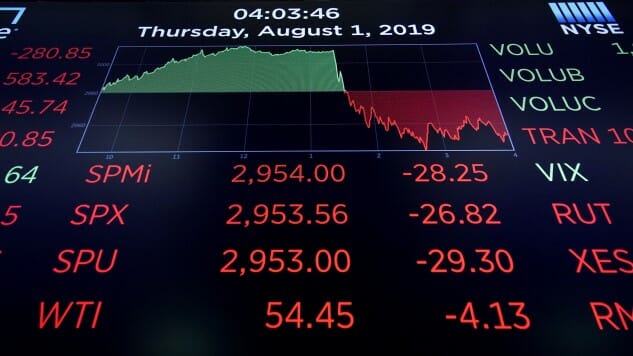Are We in a Recession Right Now?
Photo by Drew Angerer/Getty
According to longtime financial analyst Gary Shilling, the answer to the question posed in the title is “yes.” Shilling said recently that “I think we’re probably already in a recession but I think it will probably be a run-of-the-mill affair, which means real GDP would decline 1.5% to 2%, not the 3.5% to 4% you had in the very serious recessions.” Those percentage points to major investors like him quantify returns, but for many of those less advantaged by America’s system, a half a percentage point in GDP contraction could mean losing their job or struggling to put food on the table. While this is framed by most of our major media as a story of markets going up or down, the 2008 crisis taught us all that there martyrs to every downturn, and we cannot look at this as just a bunch of numbers on a screen. Plus, given the looming calamities of Brexit and Trump’s ever-escalating trade war, I would assert that Gary Shilling is underselling the very real possibility of this being a “very serious recession.”
A big reason why a recession feels so imminent is because the United States is not the only country with big problems. The UK is pursuing the economic equivalent of jumping out of a plane and trying to construct a parachute on the way down, and with a hard Brexit date approaching this fall and British political leadership in disarray, the only certainty in this entire situation is the rapidly approaching ground, as detailed by The Guardian:
Brexit uncertainty, car plant shutdowns and the running down of stock built up before the original end of March deadline for Britain’s EU exit resulted in gross domestic product shrinking by 0.2% in the three months ending in June.
News from the Office for National Statistics of the first fall in quarterly GDP in six and a half years sparked immediate speculation that a further bout of Brexit jitters leading up to the new 31 October departure date could lead to a second successive quarter of negative growth — the technical definition of a recession.
Hong Kong is another economic red flag. Their economy has been slowed as pro-democracy protests have spread, and the uncertain future they expose is a major culprit for economic pessimism. While protesters fight for a more democratic society against an increasingly out of touch political elite (sound familiar?), one consequence has been the slowdown of major industries in Hong Kong like tourism and the retail income it brings along with it. Additionally, all this unrest makes long-term investment difficult, given the elephant in the room, as explained by the Wall Street Journal:
As a result, several research houses that had forecast slight growth for the $363 billion economy in the third quarter now expect a quarter-on-quarter contraction, the second such decline in a row and a technical definition of recession. For the full year, Hong Kong’s outlook has fallen by around half to 1% growth, new estimates show.
The economic damage may be permanent, observers say. Hong Kong has weathered political crises before. But this one has raised the specter of military intervention by mainland China, a move most believe would end Hong Kong’s status as a free-market linkage point between China and the West. While the chances remain remote, the fact that it is even a possibility could deter investment for years to come.
Before we even get to the United States, two of the most important trade hubs in the world are on the brink of a measurable recession. That is a major reason why so many feel there are ominous clouds overlooking the U.S. economy, and that’s not even taking into consideration Trump’s moronic trade war with China, Canada, Mexico, the U.K. and the EU that is actively exacerbating economic tumult across the globe. Ten weeks ago, I wrote about a key economic indicator indicating that we were either in or about to be in a recession, and now that key economic indicator is “inches away from flashing a recession signal” according to CNBC. Plus, we are also not the only country facing this dynamic.
Yield curves all around the globe are inverted right now. pic.twitter.com/enhlzLQzG6
— Michael A. Gayed, CFA (@leadlagreport) May 25, 2019
Recessions happen because capitalism. That’s not some leftist critique, that’s just how this boom and bust system works. They come about every ten years and our last one happened eleven years ago (while depressions come every hundred years or so, with the last one hitting about ninety years ago). If you have 30 minutes to spare, this explanation on how both money and the economy work by legendary investor Ray Dalio will simplify the complex issue better for you than any economics class could (and I say this as someone who took economics classes in college).
Ultimately, the figure looming over this column is President Donald Trump. His chance at re-election comes next year, and the recent history of presidential contests is that bad economies sink incumbents while good economies buoy them. While our rigged economy ensures that it will never be prosperous for all, or even most, the overall metrics right now point towards a good economy. Job growth has been steady, the stock market is rising and consumer and investor confidence has been steadily hovering between above average and good during the Trump presidency, despite its constant atrocities.
This should not only give you a good idea of how the economy works, but what it values. Ultimately, the president has very little to do with the day to day economy. Decisions they make can create systems which shape the economy for decades (think of Woodrow Wilson’s income tax or how all presidents from Reagan through George W. Bush worked to repeal all the progress we’d made over the previous hundred years against oligarchy), but typically on a day-to-day basis, what the president does has very little positive impact on the economy. The Fed chairman has a much larger day-to-day impact on the economy, and they just lowered interest rates, which confirms that the Federal Reserve is worried about a recession.
You’ll note that I qualified that last statement about the president with “positive,” because presidents are like baseball managers in that staying out of the way of the game is usually the best decision. The more involved one gets, the more one risks doing serious damage. The baseball equivalent of Trump’s trade war is starting your second baseman at pitcher and your first baseman at catcher and letting the mascot DH and bat cleanup. Trump can rock the markets with a single tweet, but it is much more difficult for him to lift it with one. How the economy fares over the next 15 months is already mostly set in stone, and there is far, far, far more that Trump can do to make it worse than he can to make it better. It sure looks like if we are not already in a recession, then we are on the precipice of one—and history tells us that if this recession lasts until election day 2020, then we will very likely be inaugurating a new president come January 2021.
Jacob Weindling is a writer for Paste politics. Follow him on Twitter at @Jakeweindling.







































